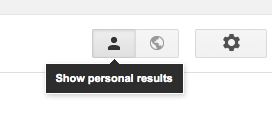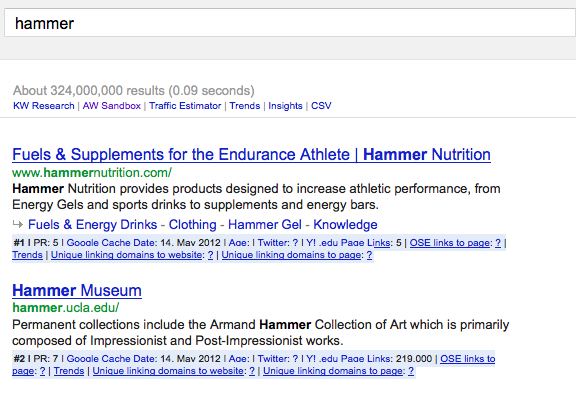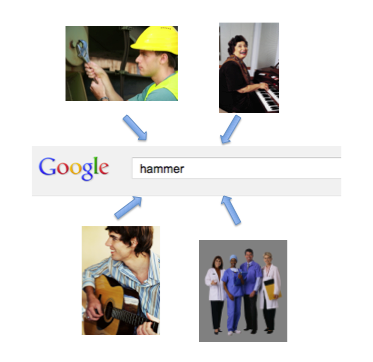Today’s post is focused on a hot topic in search: Personalization. Personalization is Google’s attempt to personalize search results based on a variety of individual factors, including web history, social connections, and much more.
In the following video, Eric interviews Bruce Clay of Bruce Clay, Inc. gives his thoughts on Google and personalization:
Key Points
- Web history has existed for 5 years, and Google uses this information to tailor search results to individuals.
- Google is trying to overcome ambiguity. When you search for a term like “hammer,” what do you mean?
- Two people might be searching for the same word and get different results, depending on their location and web search history.
- While personalization may lead to less false positive results (and therefore lower total site traffic), it also leads to more highly targeted visitors to your website. This can actually increase conversion rates as a percentage of search traffic in some cases.
- In some cases, personal history may give Google incorrect signals, and actually increase the amount of false positives.
- Ranking is no longer the best way to track SEO efforts, as ranking will vary from person to person.
- In the past, SEO professional’s were optimizing around one word, whereas in the future, they will have to optimize for communities.
Full Interview Transcript
Eric Enge, Perficient Digital: Hi, I’m Eric Enge with Perficient Digital. I’m here today with Bruce Clay. We are going to take on an interesting topic, which is that of personalization. But, Bruce, why don’t you introduce yourself for us?
Bruce Clay, President, Founder, Bruce Clay, Inc.: Thank you. Bruce Clay Inc. We’ve been in business since January of 1996. We focus on internet marketing optimization. That is; SEO, PPC, analytics, social conversion, and information architecture.
We sponsor a lot of conferences that many people probably have gone to. I am sure at one point or another they’ve had a drink ticket with my name on it. So, that’s an important networking activity we support.
Eric Enge: You know how to make friends.
Bruce Clay: I do. Certainly, sponsoring drinks is one sure-fire way of doing it. It’s the ultimate social media platform at a conference.
Eric Enge: Right!
Bruce Clay: So, we do that. We have offices internationally and we’re (centrally) located in Southern California.
Eric Enge: Awesome! So, today we wanted to talk, like I said, about personalization a bit.
Boy, there are a lot of dimensions to that. But we’re going to try to hit the high points here, I guess, and maybe you could give me your sense of what personalization involves at Google today and where you think it might go.
 |
Bruce Clay: Personalization is a little bit like the blind man and the elephant. No matter what part of the elephant you touch, it looks like a different kind of an animal. Unless you see the whole thing, you don’t know it’s an elephant. I think personalization fits into that.
I think, in the beginning, Google had; well, if you remember back, Google had 10 blue links, one algorithm, one-size-fits-all, no matter where you were in the world you got the same 10 results.
For about five years, they’ve been attempting to auto-localize. They’ve been attempting to look at your web history and web history has existed for about five years.
I think the impact on search results has been growing over time, but I have slides in my training course where we talk about web history from five years ago. I have samples of those slides.
What I think has been going on is Google has been fighting the battle against something called ambiguity. Ambiguity is where somebody puts in a word and Google doesn’t know what you meant.
What I really like is my example for a search for “hammer.” Now, we all know what a hammer is. But if you search for hammer in Google, the number one result is a vitamin. The number two result is the Armand Hammer art museum at UCLA. And the number three result is a bowling ball known as “The Hammer.” Number four is Wikipedia, number five is MC Hammer. Nowhere in there are you really dealing with striking instruments.
 |
But, they didn’t know what you meant by “hammer.” Now, we can keep going. Guns have hammers. Pianos have hammers. I mean, there’s a lot of different things going on. So, Google has attempted to give you nutrition and art and sports. The best hammer in each of them, because they’re the popular categories.
Well, that ambiguity becomes a problem for Google. So, where web history is played, and this personalization, is they’ve started to look at where are you and what have you previously searched for? So, if I search for equipment and tools and pliers and screwdrivers and then hammer, they’re gonna know what kind of hammer I’m likely looking for.
Eric Enge: Right.
Bruce Clay: Personalization, then, has migrated us from the 10 blue links one-size-fits-all to something that is individualized. It is what I want, based on what I searched for in front of it. And that personalization is changing the top 10 results for each individual, even if they search for the same word.
Now, the good news is, if somebody actually does go to my site for hammer, it’s going to be a more targeted visitor. The bad news is, I’m not going to get as many false positives, if you will; people that will find my site when they didn’t really want the tool.
Eric Enge: Right. A little less serendipity.
Bruce Clay: Yeah. So, my traffic is going to drop, but my conversion, perhaps, won’t. And my conversion as a percentage may actually improve.
So, I think Google is using personalization as a way to address “how do I better target the search results by eliminating ambiguity?” And I think that’s really part of the battle.
Eric Enge: Right. Well, that makes a lot of sense.
On January 10th, actually, we got the Search Plus Your World update from Google, which introduced a new level of personalization to search results, didn’t it?
 |
Bruce Clay: Yes. I refer to it as Search Rocks Your World. There were so many things that changed that people saw dips in traffic. A lot of eCommerce sites saw the traffic drop without actually seeing a conversion change, which is what I had alluded to. But they immediately freaked out because of the traffic drop. Now, I think that that’s a natural kind of a thing.
But I’ll tell you where the problem comes in, is that nobody knows how to get rid of web history. That means that I’m getting even more false positives. If I search for baby gifts because one of my employees had a baby, and then I search, because I’m going to a conference in Las Vegas, if I search for Las Vegas hotels the last thing I want is Las Vegas hotels catering to babies. Trust me. That’s not what I’m after.
So, you know, it could backfire on me finding results, and we’ve heard many people; many people indicate that the Google results are not any better; that they’re actually worse.
I think that one of the reasons they’re worse is that they’re using mixed queries. They’re searching for this gift and then that destination and then this travel means, and the signals are actually creating false positives. And I think that makes it a little bit harder.
The other thing you have to understand is, you know when Google does all this, the intent is to improve. They don’t always get to improve.
Eric Enge: Right. It’s not as simple as you might think it is. Just because we can take one scenario and design an algorithm for that, we need to remember it’s being designed for, really, literally billions of scenarios.
 |
Bruce Clay: Yeah. How do you anticipate what somebody would have searched for before they searched for your keyword?
Eric Enge: Right. And I think when I interviewed Google’s Jack Menzel last, one of the things that he commented on is that is exactly one of the reasons why they don’t reach that far back into the web history and they keep it fairly localized just to try to minimize some of the fallout from that kind of problem.
Bruce Clay: But it also impacts the ability to use, for instance, in SEO, a lot of people using ranking as a determining factor of how well am I doing.
And unless you have an apples and apples and apples way of determining ranking, it turns out that you can say “I’m in position five” and everybody else sees you in position 20. They don’t even see you at all. So, it does mess up the SEO methodology a little bit.
Eric Enge: Yes, it does.
Any other thoughts that we should add on personalization before we finalize?
Bruce Clay: Well, I think that personalization is being comingled with other things. I think we’re gonna see it actually change the way pay-per-click works as a part of that algorithm.
You know, Google makes money on pay-per-click. They obviously want that to work.
We know that localization is occurring in the Google Places realm. Places was occasional, then it’s 30 percent, and now I expect it, within a year and a half, two years, to be 70 percent of all queries that have places on them.
Auto-localization is happening. I think that SEO becomes harder. I think that we as search engine optimization professionals have got to understand and wrap our head around the persona of the actual target.
We try to anticipate the keywords that they’re going to use and then content has to be changed. So many people for so long have written content around one keyword, not around a community. And I think that that change is going to impact how the whole world optimizes for traffic. And I expect it to be a very exciting period.
Eric Enge: Well, that’s awesome. That’s a big thought to leave this off on, but actually a really good one for people to think about.
Thanks for taking the time to be with us today, Bruce.
Bruce Clay: Thank you.
